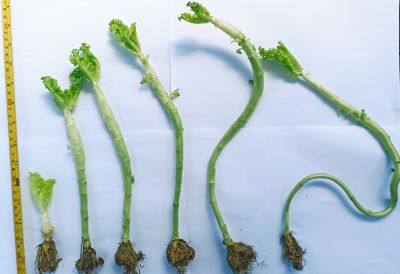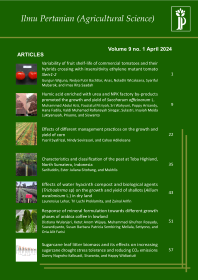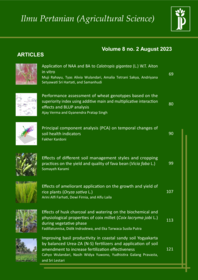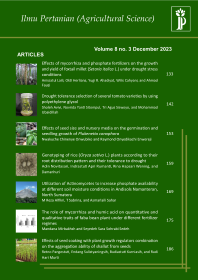
Role of Gibberellic Acid (GA₃) in enhancing growth and yield of hydroponically grown lettuce (Lactuca sativa L.)
Resti Fadillah(1*), Rizka Wildani(2), Varaditta Putri Zahra Salsabila(3)
(1) Indonesian Defense University
(2) Politeknik Lingga
(3) Indonesian Defense University
(*) Corresponding Author
Abstract
Gibberellin (GA₃) is a growth hormone that is essential in plant physiological processes. At present, gibberellins are employed in commerce to enhance the physical traits and yield of various vegetable, horticultural, ornamental, and medicinal crops. This research aimed to study the effects of gibberellin application on the morphological characteristics and yield of lettuce plants. The study was arranged in a Completely Randomized Design (CRD) with six treatments of gibberellins concentration with a hydroponic system, namely: G0 = control, G1 = 20 ppm, G2 = 40 ppm, G3 = 60 ppm, G4 = 80 ppm, and G5 = 100 ppm, and each treatment consisted of four replications. This research was conducted in May–July 2023 at the Kemuning Greenhouse, Belu Regency, East Nusa Tenggara. GA₃s were sprayed twice at 2 weeks after sowing and 1 week after transplanting. The results showed that the highest GA₃ concentration (100 ppm) had a negative impact on plant morphology and yield, producing the smallest number of leaves, too long stem, pale green leaves, and the lowest fresh weight. Meanwhile, GA₃ concentration of 40 ppm resulted in the highest number of leaves. However, this increase is not directly proportional to the fresh weight of the leaves. GA₃ concentration of 40 ppm resulted in the best and most efficient yield of leaves and fresh weight, making it highly recommended.
Keywords
Full Text:
PDFReferences
Bultynck, L., and Lambers, H. (2004). Effects of Applied Gibberellic Acid and Paclobutrazol on Leaf Expansion and Biomass Allocation in Two Aegilops Species With Contrasting Leaf Elongation Rates. Physiologia Plantarum, 122(1), pp. 143–151.
Dayan, J., Voronin, N., Gong, F., Sun, T. P., Hedden, P., Fromm, H., and Aloni, R. (2012). Leaf-Induced Gibberellin Signaling is Essential for Internode Elongation, Cambial Activity, and Fiber Differentiation in Tobacco Stems. Plant Cell, 24(1), pp. 66–79.
Digby, J., and Wareing, P. F. (1966). The Effect of Applied Growth Hormones on Cambial Division and the Differentiation of the Cambial Derivatives. Annals of Botany, 30(119), pp. 539–548.
Frasetya, B., Nurfatha, N., Harisman, K., and Subandi, M. (2018). Growth and Yield of Hydroponic Watermelon with Straw Compost Substrate and Gibereline (GA₃) Application. IOP Conference Series: Materials Science and Engineering, 434(1), 012111.
Gelmesa, D., Abebie, B., and Desalegn, L. (2010). Effects of Gibberellic Acid and 2,4-dichlorophenoxyacetic Acid Spray on Fruit Yield and Quality of Tomato (Lycopersicon esculentum Mill.). Journal of Plant Breeding and Crop Science, 2(10), pp. 316–324.
Khan, M.M.A., Gautam, C., Mohammad, F., Siddiqui, M.H., and Naeem, M. (2006). Effect of Gibberellic Acid Spray on Performance of Tomato. Turkish Journal of Biology, 30(1), pp. 11–16.
Kim, M.J., Moon, Y., Tou, J.C., Mou, B., and Waterland, N.L. (2016). Nutritional Value, Bioactive Compounds and Health Benefits of Lettuce (Lactuca sativa L.). Journal of Food Composition and Analysis, 49, pp. 19–34.
Lopez, A., Javier, G. A., Fenoll, J., Hellin, P., and Flores, P. (2014). Chemical Composition and Antioxidant Capacity of Lettuce: Comparative Study of Regular-sized (Romaine) and Baby-sized (Little Gem and Mini Romaine) Types. Journal of Food Composition and Analysis, 33(1), pp. 39–48.
Maharani, A., Aneloi Noli Laboratorium Fisiologi Tumbuhan, Z., and Biologi, J. (2018). Effects of Giberelin (GA₃) Concentration on Growth of Chinese Kale (Brassica oleracea L. Var alboglabra) in Various Medium using Hydroponic Wick System. Jurnal Biologi Universitas Andalas (J. Bio. UA.), 6(2), pp. 63–70.
Miceli, A., Romano, C., Moncada, A., Piazza, G., Torta, L., D’Anna, F., and Vetrano, F. (2016). Yield and Quality of Mini-watermelon as Affected by Grafting and Mycorrhizal Inoculum. Journal of Agricultural Science and Technology, 18, pp. 505–516.
Miceli, A., Vetrano, F., Sabatino, L., D’Anna, F., and Moncada, A. (2019). Influence of Preharvest Gibberellic Acid Treatments on Postharvest Quality of Minimally Processed Leaf Lettuce and Rocket. Horticulturae, 5(3), 63.
Maciel, A.O., Christakopoulos, P., Rova, U., Antonopoulou, I. (2022). Carbonic Anhydrase to Boost CO₂ Sequestration: Improving Carbon Capture Utilization and Storage (CCUS). Chemosphere, 299, pp. 1–25.
Ogasawara, N., Hiramasu, T., Ishiyama, K., Fushimi, H., Suzuki, H., and Takagi, H. (2001). Effects of gibberellic acid and temperature on growth and root carbohydrates of Delphinium seedlings. Plant Growth Regulation, 33, pp. 181–187.
Pal, P., Yadav, K., Kumar, K., and Singh, N. (2016). Effect of Gibberellic Acid and Potassium Foliar Sprays on Productivity and Physiological and Biochemical Parameters of Parthenocarpic Cucumber cv. “Seven Star F1.” Journal of Horticultural Research, 24(1), pp. 93–100.
Pertiwi, P.D., Agustiansyah, and Nurmiaty, Y., (2014). Pengaruh Giberelin (GA₃) terhadap Pertumbuhan dan Produksi Tanaman Kedelai (Glycine max (L.) Merrill.). Jurnal Agrotek Tropika, 2(2), pp. 276–281.
Rahayu, W.S., Mukarlina, and Linda, R. (2018). Pertumbuhan Tanaman Selada (Lactuca sativa L. var. New Grand Rapids) menggunakan Teknologi Hidroponik Sistem Terapung (THST) Tanpa Sirkulasi dengan Penambahan Giberelin (GA₃). Protobiont, 7(3), pp. 62–67.
Riko, N., Aini, S. N., and Asriani, E. (2020). Aplikasi Berbagai Konsentrasi Giberelin (GA₃) terhadap Pertumbuhan Tanaman Kailan (Brassica oleracea L.) pada Sistem Budidaya Hidroponik. Jurnal Hortikultura, 29(2), pp. 181–188.
Setiawan, and Wahyudi, A. (2014). Pengaruh giberelin terhadap pertumbuhan beberapa varietas lada untuk penyediaan benih secara cepat. Bul. Littro, 25(2), pp. 111–118.
Sugiura, D., Kojima, M., and Sakakibara, H. (2016). Phytohormonal Regulation of Biomass Allocation and Morphological and Physiological Traits of Leaves in Response to Environmental Changes in Polygonum cuspidatum. Frontiers in Plant Science, 7, 1189.
Suherman, C., Nurainni, A., Wulandari, V.S.R. (2017). Respons Tiga Klon Tanaman Rami (Boehmeria nivea (L.) Gaud) terhadap Konsentrasi Asam Giberelat yang Berbeda. Jurnal Kultivasi, 16(3), pp. 494–501.
Triani, N., Permatasari, V. P., and Guniarti, G. (2020). Pengaruh Konsentrasi dan Frekuensi Pemberian Zat Pengatur Tumbuh Giberelin terhadap Pertumbuhan dan Hasil Tanaman Terung (Solanum melongena L.). Agro Bali: Agricultural Journal, 3(2), pp. 144–155.
Vetrano, F., Moncada, A., and Miceli, A. (2020). Use of Gibberellic Acid to Increase the Salt Tolerance of Leaf Lettuce and Rocket Grown in a Floating System. Agronomy, 10(4), 505.
Wildani, R., Ahmad, U., Rafi, M., Ari, S., and Ratnanto, D. (2021). Effect of Hydrogen Peroxide Treatment on the Concentration of Volatile Compound in Coriander Seeds Oil. Advances in Food Science, Sustainable Agriculture and Agroindustrial Engineering, 2021(2), pp. 76–84.
Yuan, L., and Xu, D.Q. (2001). Stimulation Effect of Gibberellic Acid Short-term Treatment on Leaf Photosynthesis Related to the Increase in Rubisco Content in Broad Bean and Soybean. Photosynth. Res., 68, pp. 39–47.
Article Metrics
Refbacks
- There are currently no refbacks.
Ilmu Pertanian (Agricultural Science) ISSN 0126-4214 (print), ISSN 2527-7162 (online) is published by Faculty of Agriculture Universitas Gadjah Mada collaboration with Perhimpunan Sarjana Pertanian Indonesia (PISPI) and licensed under a Creative Commons Attribution-ShareAlike 4.0 International License.













